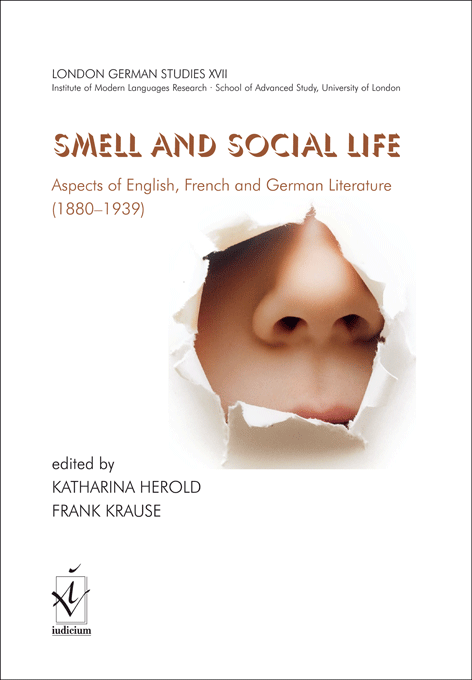Japan und Ostasien
Germanistik /
Deutsch als Fremdsprache
Kulinaristik
Kulturwissenschaften
|
 |
Senden Sie Fragen oder Kommentare zu dieser Website an:
info@iudicium.de
iudicium verlag
Dauthendeystr. 2 · 81377 München
Deutschland
Copyright · 2024
|
|
| |
|
 Herold, Katharina / Krause, Frank (eds.)
Herold, Katharina / Krause, Frank (eds.)
Smell and Social Life
Aspects of English, French and German Literature (1880–1939)
2021 · ISBN 978-3-86205-629-3
278 Seiten, kt. · EUR 42,—
LONDON GERMAN STUDIES XVII
Institute of Modern Languages Research · School of Advanced
Study · University of London
Literary references to smell in social contexts have a long tradition. However, the significant contribution of odour imagery to our moods and emotions goes largely unnoticed, which accounts for the comparatively late attention paid to smell in research into the significance of sensory images in literature. The wellknown capacity of smell motifs to affirm and disrupt social and aesthetic norms cuts across historical periods, but the ways in which specific literary-historical periods renew motifs of smell in social life have remained underexplored. This volume, based on the interdisciplinary conference that took place in November 2018 at the University of London's Institute of Modern Languages Research, gives an overview of such innovations in English, French and German literature during the timespan between the ‘olfactory explosion’ in 1880 and the break-up of modern movements
in 1939.
Open Access Download PDF
 (Dateigröße: 5,3 MB)
(Dateigröße: 5,3 MB)
|
INHALT
- List of Illustrations
- Acknowledgements
- Katharina HEROLD and Frank KRAUSE: Introduction
- Barry C. SMITH: The Hidden Sense of Smell: Recent Scientific Findings
- Michel DELVILLE: The Smell of Disgust: Modernism and the Social Politics of Olfaction
Smell and Ethical Values: Modern Variations of Traditional Diagnoses:
- Maria WEILANDT: Stereotyped Scents and ‘Elegant Reality’ in Edmond de Goncourt’s Chérie (1884)
- Frank KRAUSE: ‘Follow the scent: one will seldom err’: The Stench of Failed Nietzschean Practice in André Gide’s The
Immoralist (1902) and Thomas Mann’s Death in Venice (1912)
- Susanne SCHMID: Lemon Trees, Vile
Odours and No Smells at All: Olfaction in Elizabeth Bowen’s, George Orwell’s and Arnold Bennett’s Hotels
The Readability of Smells: Crises, Subversions and Complications:
- Sophie-Valentine BORLOZ:
‘We are beginning to suffer indigestion from the flowers of innocence’: The Subversion of Floral Fragrance in French Literature of the End of the Nineteenth Century
- Katharina HEROLD: ‘European noses […] have never smelt anything like it’: Satirical Scents in Paul Scheerbart’s Decadent Orient
- Sergej RICKENBACHER: Literary Halitosis: Bad Breath and Odol in German Literature around 1900
- Jon DAY: James Joyce and the Legibility of Odour (or, Towards a Scratch ‘n’ Sniff Ulysses)
The Authority of Smells: Reassessments:
- Catherine MAXWELL: ‘Bringing the perfume out of everything’: Vernon Lee, Scent, and Memory
- Érika WICKY: A Good Eye, Taste and Flair: The Sensory
Skills of the Fin-de-Siècle Collector
- Andreas KRAMER: ‘Dada smells like nothing’: Sniffing out the Dada Corpus
- Tag GRONBERG: Scents of the Mother
- Notes on Contributors
- Bibliography
- Index
|
| |
|
